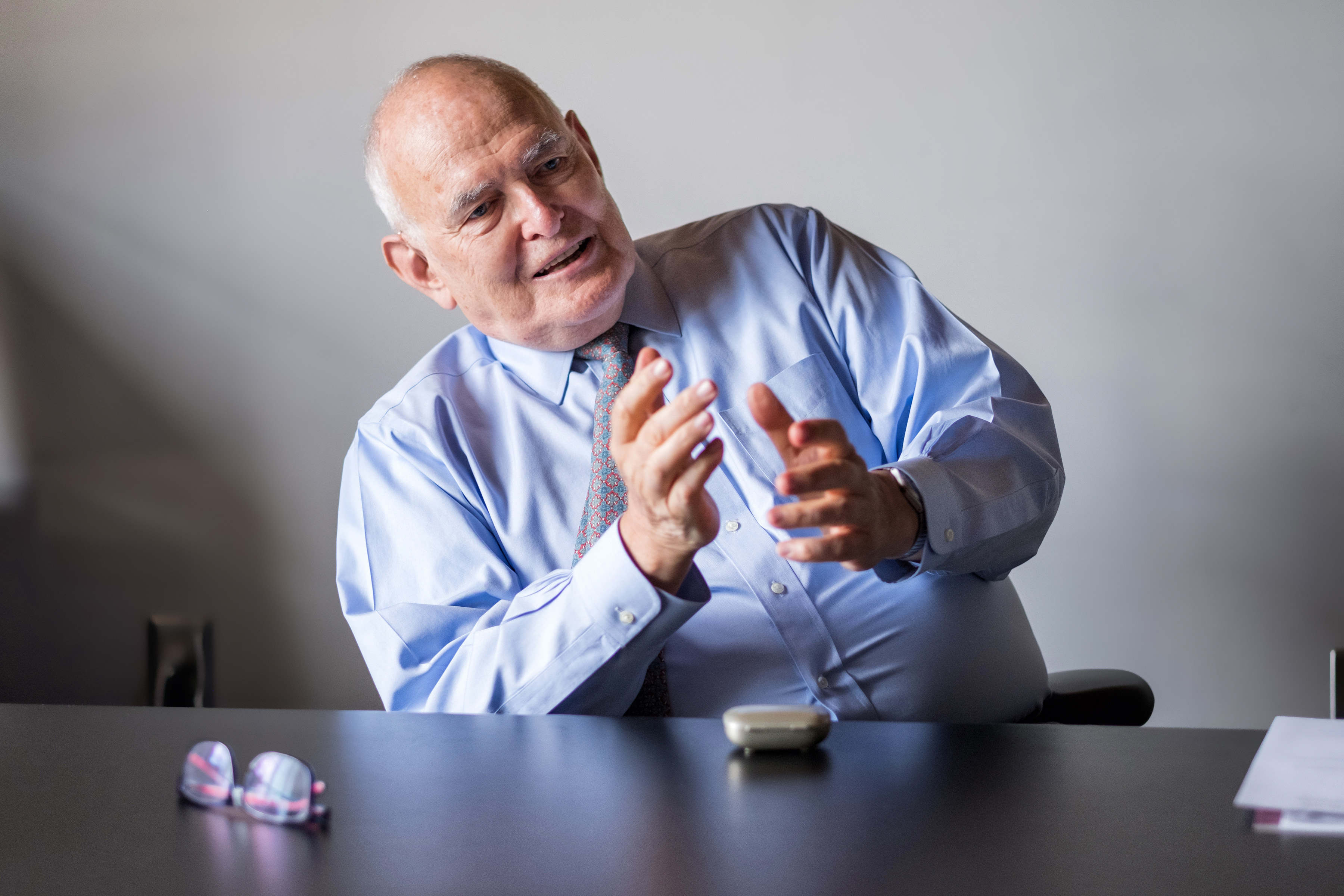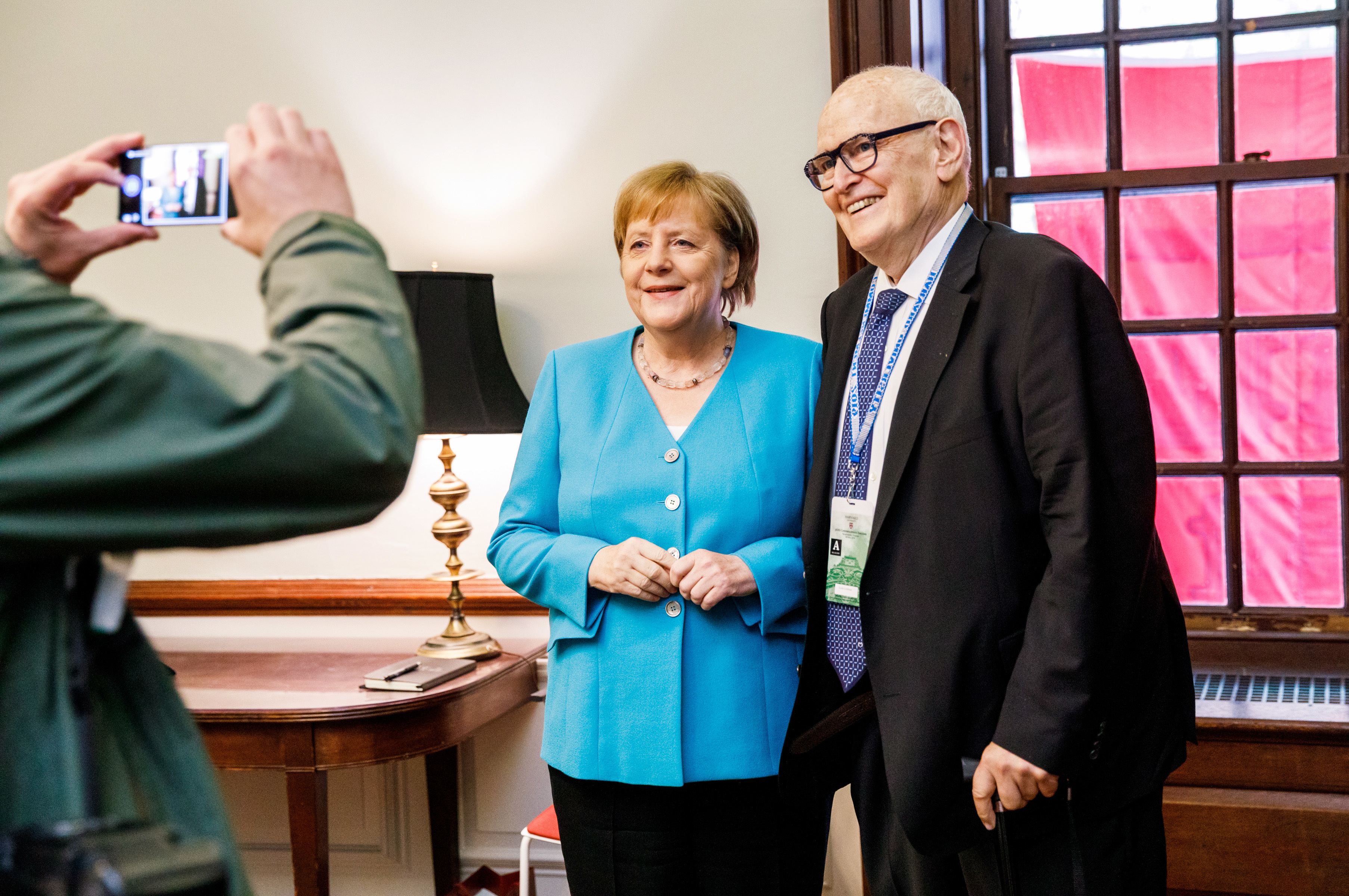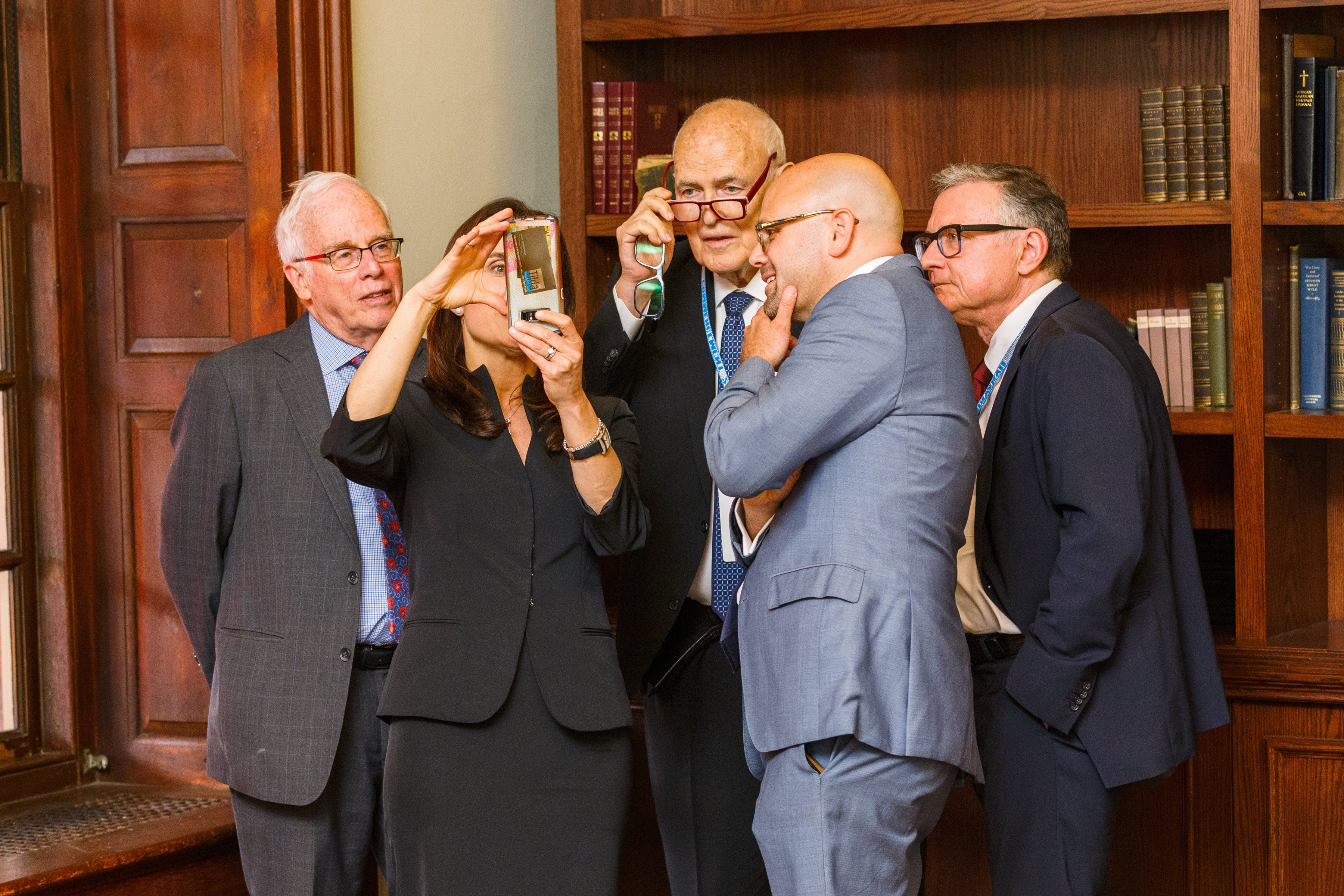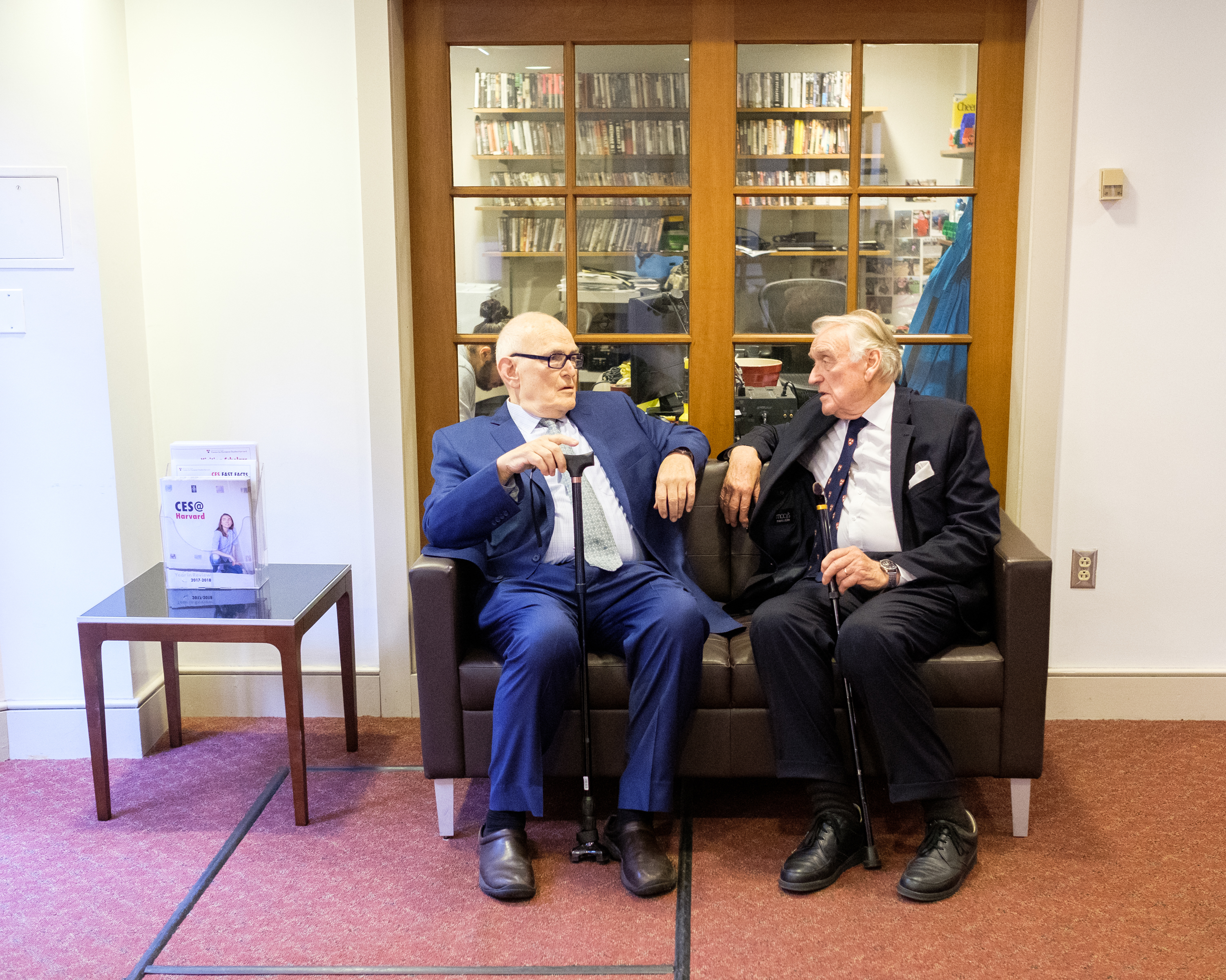In memoriam: 11.4.1937-11.30.2020
On the one-year anniversary of Guido Goldman’s passing, the Minda de Gunzburg Center for European Studies (CES) remembers its co-founding director with a preview of his recently published biography and an interview with author Martin Klingst.
CES Affiliate Art Goldhammer spoke with Martin about his book, Guido Goldman: Transatlantic Bridge Builder (Berghahn Books, 2021), and reflected upon Guido’s life, inspirations, and legacy.
Goldhammer: In your book you write that it was Guido himself who asked you to write his biography and that you had doubts about accepting the offer. What persuaded you to set those doubts aside?
Klingst: The project began when the German Marshall Fund (GMF) and Guido Goldman approached me to write about him and the GMF on its 50th anniversary. I thought a book about Guido and his family would be more interesting than only writing about the institutions he founded. Guido’s father Nahum Goldmann (Guido would eventually drop the second ‘n’ from the family name) was the second president of the World Jewish Congress and negotiated German reparations to the Jews after World War II. That, I thought, would make a very interesting book, and the more I dug into this history, the more I came to feel that I was right to take on this project.
Guido and I developed a very comfortable relationship. I spent three weeks with him at his home in Concord, MA, and conducted more than 20 interviews with him and his friends ranging from Henry Kissinger to Judith Jamison, the director of the Alvin Ailey American Dance Theater, as well as curators of museums where Guido exhibited his extraordinary collection of ikats, a type of Asian textile. Guido’s lifetime coincided with a very important period in transatlantic history, as well as German, American, Jewish, and Israeli history—indeed, you can say of world history—about which I learned a lot.
Goldhammer: You mentioned the importance of Guido’s family background and his father’s role as head of the World Jewish Congress. Yet the picture you paint of his family life is one filled with tension between him and his parents, who he felt neglected him. Can you say a few words about the nature of his home life and how that might have affected his decision to focus his work on transatlantic issues?
Klingst: [Guido’s] parents were rather cold. His mother suffered from depression, and his father was all about politics and his work for the World Jewish Congress. They were not very interested in their children. Guido’s father didn’t even know the dates of his sons’ birthdays.
Guido did find warmth, however, in his relationship with his nanny Ruth, a Black woman from Barbados. She was very kind. She let Guido sit on her lap and watch as she worked in the kitchen. He loved to be around the people who worked in the kitchen—and there was a large staff because the Goldmann family was wealthy and maintained a large apartment in New York City.
Ruth opened Guido’s eyes to issues of social injustice. He liked to tell a story about returning with his parents from a visit to the opera. They often took the boys to the opera on Sundays. One Sunday, upon returning home, Guido went to the elevator that was used only by the servants. His father was upset and asked why he chose that elevator. And Guido said, “Well, daddy, whenever I go out with Ruth, who takes me to school and other places, we take this elevator. So, I think it’s only natural for me to take it when I’m alone. You are a great advocate for Jewish causes, but you should also do something for African-Americans, who are also subject to discrimination. You should do something about the segregated elevators in our building.” And Guido’s father did as Guido asked. This story shows that Guido became interested in issues of social justice at a very early age.
Guido also learned from his father the importance of good networking skills. He had friends all over, and many acquaintances and business contacts, and he made good use of his networks to further the causes in which he was interested.
As for why he chose to focus on American-European relations, especially German-American relations, I think that stemmed from the influence of his parents. Both were raised in Germany before World War II, and both held German citizenship which they lost under the Nazis. They fled Germany for Switzerland, where they lived until 1940, when they moved to New York, but they retained many good memories of Germany from before the Nazi era. They were fond of German literature, music, and art.
In fact, Guido was slow to find his way to German studies. As a student, he was interested in many things: Africa, Russia, economics, and so on. He found it difficult to decide what he wanted to do. But at Harvard, he got to know Henry Kissinger, who was teaching German political science. And later he met Karl Kaiser, a young professor whose work focused on Germany. Guido’s interests then turned in that direction. But despite these influences, serendipity was also at work. He grew up in German surroundings, and this clearly influenced the direction of his life’s work.

Goldhammer: You’ve touched on the importance of Harvard in Guido’s life. Harvard remained important even after the creation of the German Marshall Fund, which greatly expanded the scope of Guido’s activity and shifted its center of gravity to Washington, D.C. Still, he always remained committed to Harvard and, in particular, to the Minda de Gunzburg Center for European Studies (CES). Why do you think Harvard remained such a central focus for him?
Klingst: Harvard was Guido’s alma mater. It was where he studied and forged lifelong friendships with [fellow students] John Mudd and Jack Womack. He also met Stanley Hoffmann as well as Zbigniew Brzezinski and Henry Kissinger, both of whom went on to become major figures in American foreign policy.
Harvard is also the place where he started his professional career and founded his first institution, the German Research Program and the West European Studies Seminar, which eventually grew into the Minda de Gunzburg Center for European Studies [which he co-founded with Stanley Hoffmann].
He also raised a lot of money for Harvard from his many wealthy friends: the Annenbergs, the Sacklers, the de Ménils, the Bronfmans, and the Lindemanns. Guido always said he had many families. He never married. He had no children. But he had Harvard, and he had his art families—the ikat collectors and the Alvin Ailey dancers—and of course, first and foremost, the Minda de Gunzburg Center for European Studies, which was his intellectual and spiritual family, the place where he had his roots and felt most at home. He was fond of Harvard and invited people he knew from Germany to visit there. He created the John F. Kennedy Memorial Fellowship and the McCloy Fellowship, which brought Europeans to Harvard and sent Americans to Germany.
Harvard remained his home base till the end of his life. Whenever I visited him, he took me to Harvard. We even went there for breakfast. We met people, he showed me around, he showed me the dormitories where he had lived as a student. And he showed me where Willy Brandt spoke when he came to Harvard to present Guido with the gift of 150 million German marks to create the German Marshall Fund.
Goldhammer: Your description of Guido as a man with many families brings to mind a remark that his good friend Andy Markovits made, which you quote in the book. Markovits describes Guido as “a crosser of borders, a wanderer between worlds … [who] is always half of something: an academic, but only half an academic, a businessman, a Jew, an American, a German … but only half.” And Guido himself seemed to recognize that he deliberately chose not to fully commit himself to any of his many interests. To quote him, “Maybe I could have been a government minister, an ambassador, a university president, or a full professor, but I made other decisions.” The picture you paint is of a restless man. How do you understand that restlessness?

Klingst: I think Guido was a man who quickly felt bored. He had many interests and wanted to pursue them all. He was a storyteller, not a person who liked to study for months or years on end. He did not have the patience to bury himself alone in libraries. He quickly became bored with details. He was always a wanderer and a searcher. He traveled a great deal and lived in many different places. While he needed to have people around him, I would say that no one got really close to him. He knew hundreds of people, if not thousands. He was great at keeping in touch and often sent little notes. He remembered birthdays. And yet he always kept people at a certain distance.
He was a man of enormous entrepreneurial talent. He earned his living by managing large fortunes. I think these many interests kept him from focusing on one thing. After a few months, he always wanted to move on. He created and founded institutions, ran them for a time, and then moved on. He might remain on the board, but he was happy to hand over day-to-day management to others. He liked starting new things, and serendipity remained important.
For instance, it was serendipity that made him the world’s largest collector of ikats. He was in a cab in Manhattan on a rainy day when he suddenly glimpsed what he thought was a beautiful painting in a gallery window. It reminded him of Kandinsky, whose work he admired. He told the driver to stop and went into the gallery. He discovered that what he had seen was not a painting but a handwoven textile from Uzbekistan. He fell in love with the art of the ikat and began collecting examples from all over the world. At the end of his life, he donated his collection to several museums. This was typical of him.
Goldhammer: At the end of his life, you spent a lot of time with him. What struck you most about Guido as a person? Did he speak about unfinished business? And do you think that his restless energy left him feeling lonely?
Klingst: I don’t think he felt he had left unfinished business behind. What surprised me was the sheer number of people he helped, including many no one knew about. When I went through his archives, I found money transfers to people I’d never heard of, and Guido, when I asked him, would just say, “Yes, I helped them out.” For example, he knew Miles Davis, the famous jazz musician, and his first wife, Frances Taylor Davis. When they divorced, Frances was left without much money, and Guido, who remained friendly with both, helped pay for Frances’s apartment in Los Angeles until the end of her life—and she lived until over 90!
He also helped the Alvin Ailey American Dance Theater. Dancers often don’t earn a lot. Guido helped pay medical and mortgage bills and bought plane tickets when one of the dancers needed to fly home to visit a sick relative.
He was always there for people. What impressed me was that he was a very good person. He had a good heart.

He was a great storyteller but not a person who spoke openly of his inner life or feelings. His closest friends, people who knew him for decades, all agree about this. He was always a wanderer and a searcher, and this made it difficult for him to get involved with one family, one person, or one partner.
At the end, I think he was a bit lonely, even though he always had people around him, but I think no one ever got truly close.
Goldhammer: In your book, Guido describes himself rather wistfully as a man of the 20th century. World War II and the Cold War drove him to build bridges across the Atlantic. But in the 21st century, America has pivoted away from Europe. Do you think he regretted where he had placed his energy?
Klingst: No, I did not have that feeling. I think he would do it over again. But I do think he worried that Americans were beginning to forget their European heritage and that European studies were being neglected by American universities. He remained convinced that transatlantic relations are important. He recognized that the world had changed, but he felt that Americans needed to adapt without losing sight of shared values, such as democracy and the rule of law. The U.S.-European partnership is unique. Indeed, it may be more relevant today than ever. Transatlantic relations have to adapt. Our societies are changing demographically, and these changes have a huge impact on transatlantic relations. Institutions like the Minda de Gunzburg Center for European Studies and the German Marshall Fund must also adapt if future generations are to continue to support them. When Guido said he was a man of the 20th century, he meant that he would not be around to make the necessary changes but could nevertheless see that changes were necessary.
Goldhammer: How do you think Guido would want to be remembered?
Klingst: I think he would want to be remembered as a people person, a philanthropist, a humanist, and a fisher of men.

Photo Credit: Unless otherwise noted, all photos by David Elmes with the copyright held by the Minda de Gunzburg Center for European Studies (CES), Harvard University.